Africa: An Ethical and Sustainable US Business Venture in Ghana
Ghana- known 55 year ago as The Gold Coast- gained its independence from the United Kingdom in 1957. By doing so, it became the first African nation to free itself from British, French, Portuguese or Belgium colonial rulers. Even so Ghana has recently become politically more stable than most countries in sub-Saharan Africa, Ghana’s economy is in a precarious situation, and according to most regional experts and analysts, the country’s food security is under threat. Dr. Kwame Osei put the blame mainly on the policies of the International Monetary Funds (IMF) and of the World Bank.
“The government of Ghana is being dictated by primarily the IMF and the World Bank with regards to economic, monetary and fiscal policies,” Dr. Kwame Osei said. Currently, 50 percent of Ghana’s budget is funded by loans and financial assistance- with various strings attached- from the IMF, the World Bank, and countries such as China and the United States. More than two million people are unemployed, with young people especially affected, in particular in high density urban areas like Accra and Kumasi. Ghana’s manufacturing and agricultural sectors are weak, especially the agriculture. The country is not producing enough food to feed its people, and has to import a massive quantity of basic food such as rice and poultry.
This, in return, is making Ghana’s trade deficit dangerously high because of its over reliance on imported goods. Dr. Osei says that Ghana’s once thriving agricultural sector declined as the “IMF and World Bank persuaded a succession of governments to stop food production and import food instead”. This has been unfortunately, if not the intention but at least the result, of the IMF and World Bank policies in Ghana and for most developing countries: establishing a dependency on loans and imports as opposed to encourage self reliance. In Africa, the IMF, the World Bank and countries such as China and the United States are in many ways, at least economically, replacing the previous colonial power of the UK and France.
But unlike this somewhat bleak macro picture for Ghana, some smaller scale efforts are very encouraging for the country and could hopefully emulate similar initiatives encouraging local manufacturing and exports. Instead of creating a pattern of dependency to the IMF and other international organizations such private ventures could allow more people in Ghana to become independent from foreign aid, and escape this vicious cycle of loans and debts. Della is one of these sustainable ventures. In 2009, Tina Tangalakis went to Ghana as a volunteer in the town of HoHoe. Tina fell in the love with the Ghanaian people, local fabrics and crafts. It gave Tina Tangalakis the idea to create Della shortly after her return to Los Angeles. Since then, Tina Tangalakis and her company Della has built partnerships with several US companies including Nordstroms, Bloomingdales and Free People. Della makes fashion accessories produced by Ghanaian women in Ghana. The company has 17 full time employees in Ghana- 45 at the peak of production. We asked Tina Tangalakis a few questions.
Gilbert Mercier: Most Westerners- especially Americans including African-Americans- are afraid of Africa. Did you have such fear the first time you went to Ghana and if you did, how did you turn this fear into love?
Tina Tangalakis: That is an interesting question. I don’t remember having fear about going to Africa. If anything, I felt a lot of excitement and curiosity to discover a new culture. I did a lot of research prior to going, so I knew that Ghana was relatively safe. Also, on my first trip I went with a well known volunteer organization, so that gave me an additional sense of security.
As for love, well, the reason I originally went to Ghana was to volunteer at a local orphanage called Happy Kids. As cheesy as it may sound, I fell in love as soon as I saw all the smiling faces. One special moment was-upon my arrival at Happy Kids- when a nine year old boy walked up to me, introduced himself, confidently took hold of my hand and led me to the classroom. That was it. From that point on there was no going back.
GM: In a previous interview I read, you said that you quit your job the first time you went to Ghana in 2009. Were you doing some soul searching, and if so was Africa helpful in your quest to find yourself?
Tangalakis: I feel like on a certain level I have always known who I am. Balancing work, art, and humanitarian goals has always been important to me. However, prior to going to Ghana, I just was not sure how they all should fit together. In a way you can say I was in Ghana to soul search. I was at a pivotal stage in my life where I was seeking a new experience and I was lucky enough to be in the position to pursue it. I need to mention that I find it funny that you asked me about quitting my job prior to going to Ghana. I guess there is a lot of inaccurate press out there, and I did not quit my job at that time. As matter of fact, once I started Della in 2009 I worked two jobs, 80 hours a week for the first two years. Now I am fortunate enough to dedicate myself full time to Della.
GM: Do you think that your venture Della is viewed by some Ghanaians as neo-colonialism?
Tangalakis: That is a good question. Sometime I ask myself that as well. But from what I have seen, no. Ghanaians , at large, do not see it as such. I get faced with that question more in the United States than while I am in Ghana. From my experience, everyone in the community of Hohoe is exited about what we are providing to them. We work hard to provide our employees with education and benefits they want, not what we think they need. Before getting an education program in place, we asked all of our employees what type of education they want. I did not want to implement weekly education into their schedule if we were not offering something beneficial to them. Hence, after overwhelming response, we now offer literacy classes twice a week, and we usually get 100 percent attendance.
GM: Many giant foreign companies go to developing countries to exploit cheap local labor. How do the wages paid to your 17 Ghanaian employees compare with other businesses in Ghana either foreign or locally owned?
Tangalakis: We base our monthly salaries upon what an acceptable rate would be for a local educated teacher. I really cannot tell you what other foreign businesses in Ghana pay their employees, as I am not aware of it. Based upon my extensive research and experiences in Ghana, our team is very happy with what they receive. Also, the opportunity of holding down a steady job, with benefits, is rarely available to women of their social status.
GM: Additionally, do you provide any kind of social benefits to your employees in Ghana?
Tangalakis: Yes we do. Since January 2012, all Della employees in Ghana receive Social Security and health care benefits. As I mentioned before, we also seek to empower our women employees through education and skill training. On top of our literacy course, which as I mentioned previously usually get 100 percent attendance, we also offer private money management counseling for each employee. Additionally, within the structure of our workshop,we have systems in place so that the more experienced seamstresses can teach the younger ones how to improve their skills. Our philosophy is to empower Ghanaian women by giving them some tools so they can ultimately help, not only themselves but others as well.
GM- When creating Della, your goal- beside starting up a viable business- had an obvious ethical dimension. You wanted to provide jobs, education and skills to Ghanaian women. Three years later, do you feel that you are on the right track, and if so what have you so far accomplished?
Tangalakis: Yes, it took a lot of hard work, sleepless nights and some very challenging problem solving to where we are now. But I am very happy with what Della is today, what we stand for. The first two years were really rough. I learned a lot of lessons and often learned them the hard way. One of the biggest challenges was finding Ghanaian men who were willing to help empower local women. Another challenge was showing employees that we were a serious business, not a charity: with this came a level of work ethic and expectation. At this point, we have an amazing team that understands that if we all work together, then together we can all benefit.
GM: On July 10, you are launching a new product in collaboration with Apple. Can you tell us about it?
Tangalakis: We have teamed up with Apple to create limited edition MacBook cases. All of these cases are handmade by us in Ghana, using authentic Ghanaian textiles. This is a big step for a company like Apple, who is opening their doors to a product like ours. We are all excited about this new partnership, and about the opportunity provided not only to us but to other like minded businesses.
GM: After just three years, you are now dealing with some very large, strictly bottom line oriented, and some might say quite often inhuman and ruthless corporate entities. How do you plan to keep Della’s ethic and moral integrity in regards to the fate of your Ghanaian employees in such context?
Tangalakis: Again, that is a great question. This is something I think about probably on a weekly basis. Our growth right now is pretty rapid, so I need to be aware of this. Currently we have four U.S. citizens who are working for Della in Ghana as operation managers, to make sure that the structure and integrity of our business remains strong. Who also have a Ghanaian production manager who has worked with me since the beginning in 2009. As for working with larger, U.S. based companies, I know what is within our limits, both production wise and from a financial stand point. I already had to turn down large orders because their bottom line was not realistic for the type of operation we have. But I am fine with that. I think it is critical for a company to keep its integrity, especially with what we stand for- empowering Ghanaian women- and the quality of goods I know we are capable of.
Editor’s Note: All photographs courtesy of Della. Della can be found on Twitter and Facebook.
Related Articles


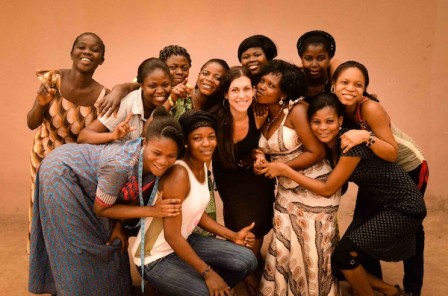
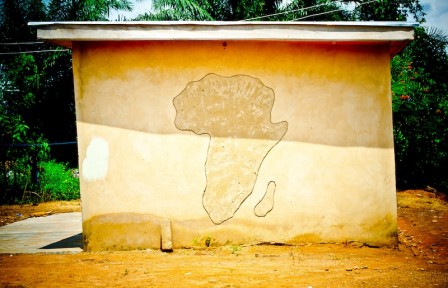
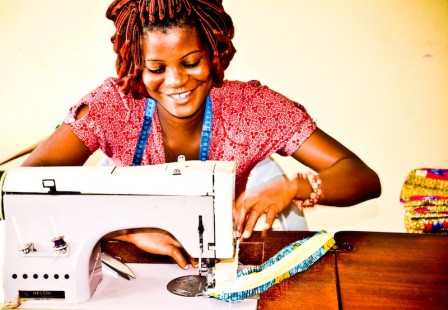
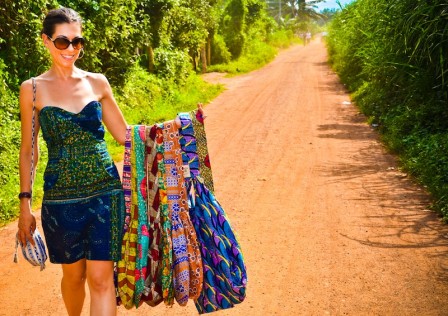
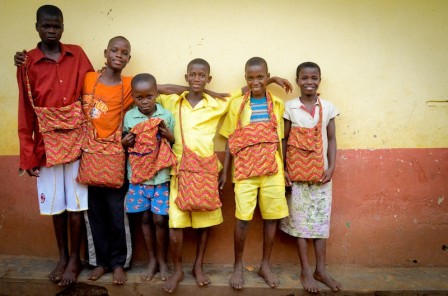
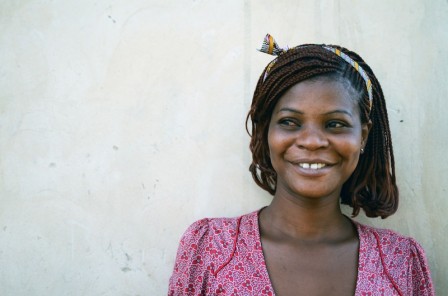
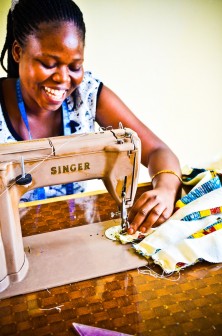
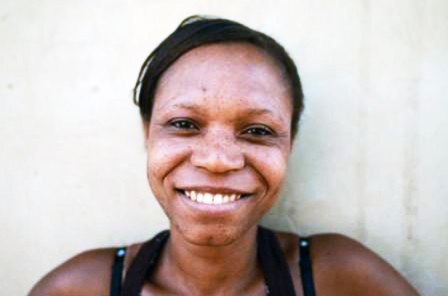
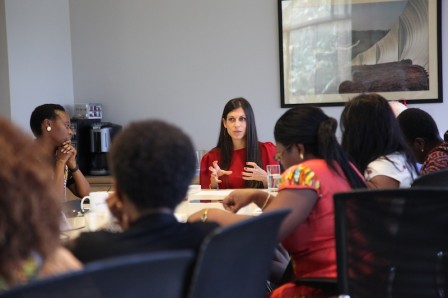
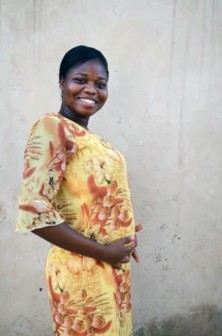











2 Responses to Africa: An Ethical and Sustainable US Business Venture in Ghana
You must be logged in to post a comment Login